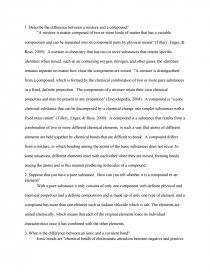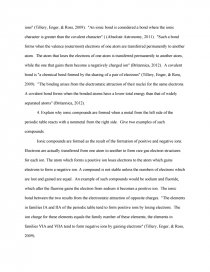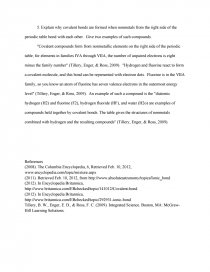Adams and Periodic Principles
Essay by Marry • April 28, 2012 • Research Paper • 956 Words (4 Pages) • 1,801 Views
1. Describe the difference between a mixture and a compound?
"A mixture is matter composed of two or more kinds of matter that has a variable composition and can be separated into its component parts by physical means" (Tillery, Enger, & Ross, 2009). A mixture in chemistry that has two or more substances that retains specific identities when mixed, such as air containing oxygen, nitrogen, and other gases; the identities remains separate no matter how close the components are mixed. "A mixture is distinguished from a compound, which is formed by the chemical combination of two or more pure substances in a fixed, definite proportion. The components of a mixture retain their own chemical properties and may be present in any proportion" (Encyclopedia, 2008). A compound is "a pure chemical substance that can be decomposed by a chemical change into simpler substances with a fixed mass ration" (Tillery, Enger, & Ross, 2009). A compound is a substance that results from a combination of two or more different chemical elements, in such a way that atoms of different elements are held together by chemical bonds that are difficult to break. A compound differs from a mixture, in which bonding among the atoms of the basic substances does not occur. In some situations, different elements react with each other when they are mixed, forming bonds among the atoms and in this manner producing molecules of a compound.
2. Suppose that you have a pure substance. How can you tell whether it is a compound or an element?
With a pure substance it only consists of only one component with definite physical and chemical properties and a definite composition and is made up of only one type of element, and a compound has more than one element such as sodium chloride which is salt. The elements are united chemically, which means that each of the original elements loses its individual characteristics once it has combined with the other elements.
3. What is the difference between an ionic and a covalent bond?
Ionic bonds are "chemical bonds of electrostatic attraction between negative and positive ions" (Tillery, Enger, & Ross, 2009). "An ionic bond is considered a bond where the ionic character is greater than the covalent character" ( (Absolute Astronomy, 2011). "Such a bond forms when the valence (outermost) electrons of one atom are transferred permanently to another atom. The atom that loses the electrons of one atom is transferred permanently to another atom, while the one that gains them become a negatively charged ion" (Britannica, 2012). A covalent bond is "a chemical bond formed by the sharing of a pair of electrons" (Tillery, Enger, & Ross, 2009). "The binding arises from the electrostatic attraction of their nuclei for the same electrons. A covalent bond forms when the bonded atoms have a lower total energy than that of widely separated atoms" (Britannica, 2012).
...
...


